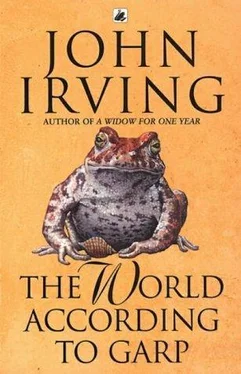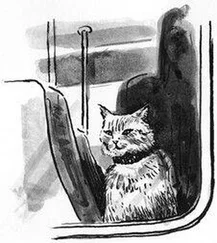“There's a nurse to see you,” his secretary said, rolling her eyes—as if this might be a paternity suit that her boss had on his hands. John Wolf and his secretary could not have known that a manuscript of 1,158 typed pages was what made Jenny's suitcase so heavy.
“It's about me,” she told John Wolf, opening her suitcase and hefting the monster manuscript to the top of his desk. “When can you read it?” It looked to John Wolf as if the woman intended to stay in his office while he read it. He glanced at the first sentence ("In this dirty-minded world..."), and he thought: Oh boy, how do I get rid of this one?
Later, of course, he was panic-stricken when he could not find a phone number for her; when he wanted to tell her that yes!—they would certainly publish this! —he could not have known that Jenny Fields was the proper guest of Ernie Holm at Steering, where Jenny and Ernie talked into the night, every night (the usual parental concern when parents discover that their nineteen-year-old children plan to get married).
“Where can they go every night?” Jenny asked. “They don't come back here until two or three, and last night it rained. It rained all night, and they don't even have a car.”
They went to the wrestling room. Helen, of course, had a key. And a wrestling mat was as comfortable and familiar to them as any bed. And much bigger.
“They say they want children,” Ernie complained. “Helen should finish her education.”
“Garp will never finish a book, with children,” Jenny said. After all, she was thinking that she'd had to wait eighteen years to begin her book.
“They're both hard workers,” Ernie said, to reassure himself and Jenny.
“They'll have to be,” Jenny said.
“I don't know why they can't just live together,” Ernie said. “And if it works out, then let them get married—then let them have a baby.”
“I don't know why anyone wants to live with anyone else,” said Jenny Fields. Ernie looked a little hurt.
“Well, you like Garp living with you,” he reminded her, “and I like Helen living with me. I really miss her when she's away at school.”
“It's lust ,” Jenny said, ominously. “The world is sick with lust.”
Ernie felt worried about her; he didn't know she was about to become rich and famous forever. “Do you want a beer?” he asked Jenny.
“No, thank you,” Jenny said.
“They're good kids,” Ernie reminded her.
“But lust gets them all, in the end,” said Jenny Fields, morosely, and Ernie Holm walked delicately to his kitchen and opened another beer for himself.
It was the “lust” chapter of A Sexual Suspect that especially embarrassed Garp. It was one thing to be a famous child born out of wedlock, quite another to be a famous case history of adolescent need—his private randiness become a popular story. Helen thought it was very funny, though she confessed to not understanding his attraction to whores.
“Lust makes the best men behave out of character,” wrote Jenny Fields—a line that particularly infuriated Garp.
“What the hell does she know about it?” he screamed. “She never felt it, not once. Some authority she is! It's like listening to a plant describe the motives of a mammal!”
But other reviewers were kinder to Jenny; though the more serious journals occasionally chided her for her actual writing, the media, in general, felt warmly toward the book. “The first truly feminist autobiography that is as full of celebrating one kind of life as it is full of putting down another,” somebody wrote. “This brave book makes the important assertion that a woman can have a whole life without a sexual attachment of any kind,” wrote somebody else.
“These days,” John Wolf had forewarned Jenny, “you're either going to be taken as the right voice at the right time, or you're going to be put down as all wrong.” She was taken as the right voice at the right time, but Jenny Fields, sitting whitely in her nurse's uniform—in the restaurant where John Wolf took only his favorite writers—felt discomfort at the word feminism . She was not sure what it meant, but the word reminded her of feminine hygiene and the Valentine treatment. After all, her formal training had been nursing. She said shyly that she'd only thought she made the right choice about how to live her life, and since it had not been a popular choice, she'd felt goaded into saying something to defend it. Ironically, a rash of young women at Florida State University in Tallahassee found Jenny's choice very popular; they generated a small controversy by plotting their own pregnancies. For a while, in New York, this syndrome among singular-minded women was called “doing a Jenny Fields.” But Garp always called it “doing a Grillparzer.” As for Jenny, she felt only that women—just like men—should at least be able to make conscious decisions about the course of their lives; if that made her a feminist, she said, then she guessed she was one.
John Wolf liked Jenny Fields very much, and he did what he could to warn her that she might not understand either the attacks or the praise her book would receive. But Jenny never wholly understood how “political” a book it was—or how it would be used as such a book.
“I was trained to be a nurse,” she said later, in one of her disarming interviews. “Nursing was the first thing I took to, and the first thing I ever wanted to do. It simply seemed very practical, to me, for someone who was healthy—and I have always been bealthy—to help people who weren't healthy or who couldn't help themselves. I think it was simply in that spirit that I wanted to write a book, too.”
In Garp's opinion, his mother never stopped being a nurse. She had nursed him through the Steering School; she had been a plodding midwife to her own strange life story; finally, she became a kind of nurse to women with problems. She became a figure of famous strength; women sought her advice. With the sudden success of A Sexual Suspect , Jenny Fields uncovered a nation of women who faced making choices about how to live; these women felt encouraged by Jenny's own example of making unpopular decisions.
She could have started an advice column for any newspaper, but Jenny Fields felt through with writing, now—just as she'd decided, once before, that she was through with education; just as she'd decided she was through with Europe. In a way, she was never through with nursing. Her father, the shocked shoe king, died of a heart attack shortly after the publication of A Sexual Suspect ; although Jenny's mother never blamed Jenny's book for the tragedy—and Jenny never blamed herself—Jenny knew that her mother could not live alone. Unlike Jenny Fields, Jenny's mother had developed a habit of living with someone else; she was old now, and Jenny thought of her as rattling about in the great rooms at Dog's Head Harbor, purposeless and wholly without her few remaining wits in the absence of her mate.
Jenny went to care for her, and it was at the Dog's Head Harbor Mansion that Jenny first began her role as counselor to the women who sought some comfort from her no-nonsense ability to make decisions.
“Even weird decisions!” Garp wailed, but he was happy, and taken care of. He and Helen had their first child, almost immediately. It was a boy named Duncan. Garp often joked that the reason his first novel was written with so many short chapters was because of Duncan. Garp wrote between feedings and naps and changes of diapers. “It was a novel of short takes,” he claimed, later, “and the credit is wholly Duncan's.” Helen was at school every day; she had agreed to have a child only if Garp would agree to take care of it. Garp loved the idea of never having to go out. He wrote and took care of Duncan; he cooked and wrote and took care of Duncan some more. When Helen came home, she came home to a reasonably happy homemaker; as long as Garp's novel progressed, no routine, however mindless, could upset him. In fact, the more mindless, the better. He left Duncan for two hours every day with the woman in the downstairs apartment; he went to the gym. He later became an oddity at the women's college where Helen taught—running endless laps around the field hockey field, or jumping rope for half an hour in a corner of the gymnasium reserved for gymnastics. He missed wrestling and complained to Helen that she should have gotten a job somewhere where there was a wrestling team; Helen complained that the English Department was too small, and she disliked having no male students in her classes, but it was a good job and she would keep it until something better came along.
Читать дальше












